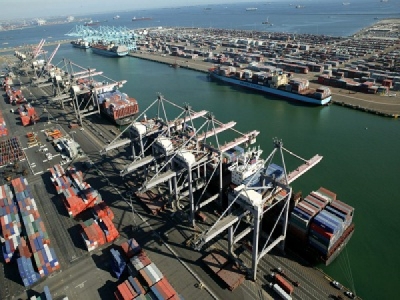
Posted on November 22, 2016
The American Association of Port Authorities (AAPA) has sent ports platform recommendations to president-elect Donald Trump’s transition team as he put forth a goal of investing up to USD 1 trillion to rebuild America’s infrastructure.
The document outlines opportunities related to strategic investments in seaports and freight transportation assets.
Some of the recommendations by APPA include relieving traffic bottlenecks and expand capacity by providing additional FAST Act investments and a sustainable freight trust fund to plan and build multimodal projects; establishing a properly funded and staffed Office of Multimodal Freight Transportation within the U.S. Department of Transportation’s Office of the Secretary; supporting funding for a robust StrongPorts program under the USDOT Maritime Administration to help ports plan for their 21st century infrastructure needs; increasing investments for authorized marine highway projects to ensure transportation alternatives alongside congested landside transportation corridors; and increasing funding for transportation infrastructure grants to USD 1.25 billion per year.
Furthermore, APPA asked Trump’s transition team to modernize and fully maintain federal navigation channels by making harbor maintenance tax (HMT) spending a priority; continuing the goal toward full use of the HMT; ensuring equity and fairness of HMT distributions; increasing funding for HMT maintenance spending in the FY2018 budget request, including funding for Donor and Energy Transfer Ports; devising a permanent solution as part of tax reform or other legislation for ensuring all annual HMT revenues are spent; increasing federal investment in navigation channel deepening and widening; improving efficiencies in the deep-draft study and construction process; continuing progress to finish navigation projects in a timely manner to better compete in world markets; and providing operations and maintenance funding for the National Oceanic and Atmospheric Administration’s Physical Oceanic Real-Time System, or “PORTS,” to help mariners navigate safely.
AAPA recommended that the government should secure America’s ports and waterside borders by increasing the Federal Emergency Management Administration’s Port Security Grant Program (PSGP) funding level to at least USD 100 million per year; directing grant funding to ports rather than to other entities with very low commercial seaport threats; continuing the management and control of the PSGP at the federal level; providing 500 additional Customs and Border Protection (CBP) maritime staff to US seaports to meet trade needs and ensure cargo is safe and moves efficiently; getting adequate federal funding to purchase, install and maintain Radiation Portal Monitors (RPM) within ports throughout the US.
The government should also help protect the environment and build resilience by increasing funding for the Environmental Protection Agency’s Diesel Emissions Reduction Act (DERA) program; creating a 21st Century Port Portfolio within the Department of Energy (DOE) that allows ports and the DOE to partner on new technologies that reduce air emissions, connect ports to the grid, provide electrification opportunities for port operations, and provide support and expertise for new clean energy terminal designs and build-outs; and ensuring federal agency programs that address natural disasters and coastal erosion include assistance to seaports to help predict, plan and adopt mitigation strategies.
“Nations worldwide have recognized the need to invest significantly in their freight networks to accommodate increasing volumes, larger vessels and be competitive. It’s vital that the United States invest significantly in its ports and freight network,” Kurt Nagle, AAPA President and CEO, said.
Nagle added that local ports and their private-sector partners plan to invest nearly USD 155 billion into infrastructure over the next five years.
Founded in 1912, AAPA represents 140 seaport authorities in the United States, Canada, Latin America and the Caribbean and more than 250 sustaining and associate members, firms and individuals with an interest in seaports.
Source: World Maritime News





